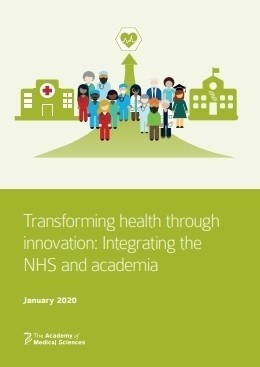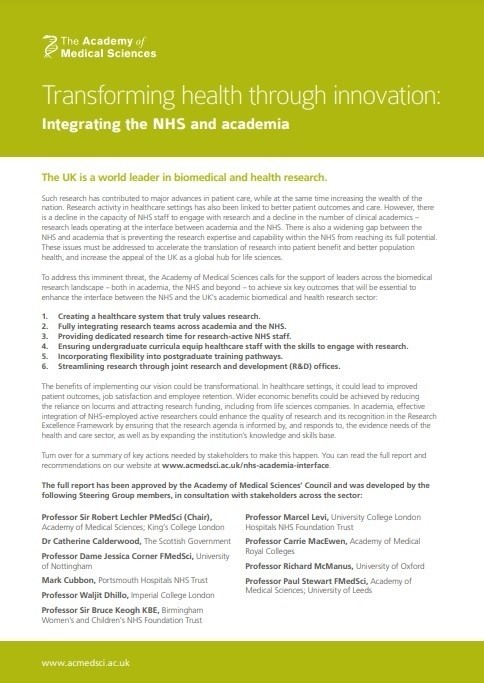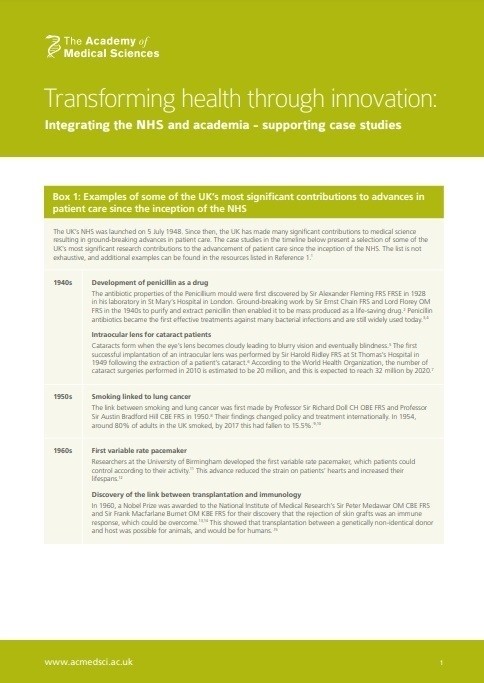Health research faces a crisis that could impact on patient care, says a new report led by 10 prominent figures in the NHS and academia.
The Academy of Medical Sciences’ report raises the alarm about the number of research active NHS staff who are finding it increasingly difficult to find time for research. Support for research is not helped by the widening gap between universities and the NHS.
Released today (Wednesday 8 January) the report is calling for leaders in universities, the NHS and government to make urgent changes to protect and enhance research in the NHS. It sets out a powerful vision to enhance the NHS research culture and support provided by universities to make sure scientific discoveries boost the NHS and improve patient care.
The report calls for immediate action by giving NHS staff protected time to do research. This should begin by running an estimated £25 million pilot scheme to allow 1 in 5 consultants to have one day a week of their time protected for research in ten hospitals across the UK. It is expected that the scheme would become cost neutral or even save money in the longer term by improving recruitment and retention of NHS staff, reducing spending on agency staff, and increasing research funding from life sciences companies.
Professor Sir Robert Lechler PMedSci, President of the Academy of Medical Sciences, said:
"Protecting and strengthening research is a win-win situation for patients, the NHS, Universities and our economy. Research is the tonic the NHS needs right now.
“There is increasing evidence that shows that patients treated in research active hospitals get better quality of care, even if they are not taking part in a research project.
“Evidence also suggests that including research in medical roles makes it easier to attract and keep the best doctors. Research can also provide a coping mechanism to avoid burnout in NHS staff, so could make a dent in the £480 million yearly NHS spend on agency staff*.”
The report also calls for:
- All healthcare organisations, including hospitals and doctors’ surgeries, to actively promote research, by valuing and measuring the health research they carry out.
- All healthcare staff, including doctors and nurses, to be trained to understand research and know how to carry it out or put it into practice.
- Universities to embrace NHS staff into their research teams by increasing the number of honorary positions they award to NHS staff.
The NHS is uniquely placed to be the engine of health research. The historic research discoveries made in the NHS over the last 70 years show how much is at stake for patients. Discoveries include the development of penicillin as a drug, the invention of Magnetic Resonance Imaging (MRI) scanners, the development of in vitro fertilisation (IVF), DNA sequencing and making advances in immunology to allow organ transplantation.
Rob Lester, a retired GP from Fife in Scotland, was diagnosed with advanced prostate cancer aged 55. He has been treated with abiraterone – a drug discovered by The Institute of Cancer Research, London, and first shown to be effective for advanced prostate cancer by research developed through a partnership between The Institute of Cancer Research (ICR) and the Royal Marsden NHS Foundation Trust.
Rob said of his treatment:
“I would call myself a lucky man – abiraterone has treated my cancer. Not only have I survived, but I am living my life and feeling better than I have in years. When I was first diagnosed with advanced prostate cancer, I hoped to survive 5 years – now I have already survived 7 years. I am alive simply because of research carried out in the NHS. We must do all we can to make sure that this type of research continues to happen in future.”
Professor Sir Robert Lechler PMedSci, continued:
“We are enjoying an exciting era of unprecedented medical discovery. Patients need us to convert this progress into new cures and better care.
“You could ask whether, at a time of too few doctors and nurses and overstretched budgets, we can afford to give time and money to research. The Prime Minister has been absolutely clear that his Government will boost funding on the NHS. Whatever improvements are made to our health service, research is a critical priority. It is important to note that every pound spent on biomedical research returns about 25p every year, forever. So we can’t afford not to do this both financially and more importantly for the health of us all.
“There is a lot at stake for the NHS and everyone treated by it. If we unite and act decisively we can boost the NHS and make sure that the breath taking scientific discoveries being made in the UK are converted into better patient care.”
Despite the known benefits of research, the report highlights that many NHS Trusts see research as ‘nice to have’. The number of medical clinical academics – NHS consultants employed by Universities to lead research – has decreased from 7.5% to 4.2% of NHS medical consultants from 2004 to 2017. Only 0.4% of GPs and 0.1% of nursing, midwifery and other health professionals had research as part of their role in 2017.
-ENDS-
Find our project page for this report here
For more information, copies of the report, additional quotes, and requests for interview please contact: Naomi Clarke, Senior Communications Officer, Academy of Medical Sciences, 020 3141 3208, 07903 158979 or 07969 082520, [email protected]
The report ‘Transforming health through innovation: integrating the NHS and academia’ is available to download here
* NHS could free up £480m by limiting use of temporary staffing agencies, NHS England
**For more information about The Institute for Cancer Research, London, visit www.icr.ac.uk
Notes for Editors
- The Academy of Medical Sciences is the independent body in the UK representing the diversity of medical science. Our elected Fellows are the UK’s leading medical scientists from hospitals, academia, industry and the public service. Our mission is to advance biomedical and health research and its translation into benefits for society. We are working to secure a future in which:
- UK and global health is improved by the best research.
- The UK leads the world in biomedical and health research, and is renowned for the quality of its research outputs, talent and collaborations.
- Independent, high quality medical science advice informs the decisions that affect society.
- More people have a say in the future of health and research.
Our work focusses on four key objectives, promoting excellence, developing talented researchers, influencing research and policy and engaging patients, the public and professionals.


